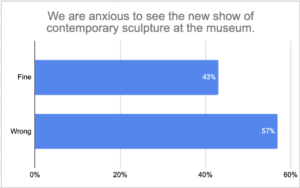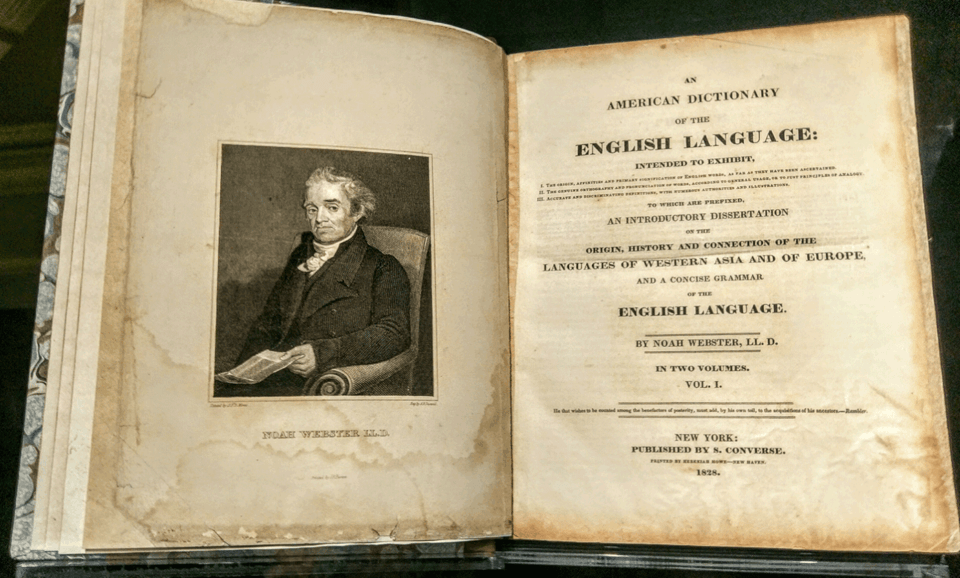By day, Leah Rachel von Essen is the editor-in-chief of Chicago Booth Magazine at the University of Chicago. By night, she reviews genre-bending fiction for Booklist, and writes regularly as a senior contributor at Book Riot. Her blog While Reading and Walking has over 10,000 dedicated followers over several social media outlets, including Instagram. She writes passionately about books in translation, chronic illness and bias in healthcare, queer books, twisty SFF, and magical realism and folklore. She was one of a select few bookstagrammers named to NewCity’s Chicago Lit50 in 2022. She is an avid traveler, a passionate fan of women’s basketball and soccer, and a lifelong learner. Twitter: @reading_while
View All posts by Leah Rachel von Essen
By day, Leah Rachel von Essen is the editor-in-chief of Chicago Booth Magazine at the University of Chicago. By night, she reviews genre-bending fiction for Booklist, and writes regularly as a senior contributor at Book Riot. Her blog While Reading and Walking has over 10,000 dedicated followers over several social media outlets, including Instagram. She writes passionately about books in translation, chronic illness and bias in healthcare, queer books, twisty SFF, and magical realism and folklore. She was one of a select few bookstagrammers named to NewCity’s Chicago Lit50 in 2022. She is an avid traveler, a passionate fan of women’s basketball and soccer, and a lifelong learner. Twitter: @reading_while
View All posts by Leah Rachel von Essen
By day, Leah Rachel von Essen is the editor-in-chief of Chicago Booth Magazine at the University of Chicago. By night, she reviews genre-bending fiction for Booklist, and writes regularly as a senior contributor at Book Riot. Her blog While Reading and Walking has over 10,000 dedicated followers over several social media outlets, including Instagram. She writes passionately about books in translation, chronic illness and bias in healthcare, queer books, twisty SFF, and magical realism and folklore. She was one of a select few bookstagrammers named to NewCity’s Chicago Lit50 in 2022. She is an avid traveler, a passionate fan of women’s basketball and soccer, and a lifelong learner. Twitter: @reading_while
View All posts by Leah Rachel von Essen
By day, Leah Rachel von Essen is the editor-in-chief of Chicago Booth Magazine at the University of Chicago. By night, she reviews genre-bending fiction for Booklist, and writes regularly as a senior contributor at Book Riot. Her blog While Reading and Walking has over 10,000 dedicated followers over several social media outlets, including Instagram. She writes passionately about books in translation, chronic illness and bias in healthcare, queer books, twisty SFF, and magical realism and folklore. She was one of a select few bookstagrammers named to NewCity’s Chicago Lit50 in 2022. She is an avid traveler, a passionate fan of women’s basketball and soccer, and a lifelong learner. Twitter: @reading_while
View All posts by Leah Rachel von Essen
By day, Leah Rachel von Essen is the editor-in-chief of Chicago Booth Magazine at the University of Chicago. By night, she reviews genre-bending fiction for Booklist, and writes regularly as a senior contributor at Book Riot. Her blog While Reading and Walking has over 10,000 dedicated followers over several social media outlets, including Instagram. She writes passionately about books in translation, chronic illness and bias in healthcare, queer books, twisty SFF, and magical realism and folklore. She was one of a select few bookstagrammers named to NewCity’s Chicago Lit50 in 2022. She is an avid traveler, a passionate fan of women’s basketball and soccer, and a lifelong learner. Twitter: @reading_while
View All posts by Leah Rachel von Essen
By day, Leah Rachel von Essen is the editor-in-chief of Chicago Booth Magazine at the University of Chicago. By night, she reviews genre-bending fiction for Booklist, and writes regularly as a senior contributor at Book Riot. Her blog While Reading and Walking has over 10,000 dedicated followers over several social media outlets, including Instagram. She writes passionately about books in translation, chronic illness and bias in healthcare, queer books, twisty SFF, and magical realism and folklore. She was one of a select few bookstagrammers named to NewCity’s Chicago Lit50 in 2022. She is an avid traveler, a passionate fan of women’s basketball and soccer, and a lifelong learner. Twitter: @reading_while
View All posts by Leah Rachel von Essen
By day, Leah Rachel von Essen is the editor-in-chief of Chicago Booth Magazine at the University of Chicago. By night, she reviews genre-bending fiction for Booklist, and writes regularly as a senior contributor at Book Riot. Her blog While Reading and Walking has over 10,000 dedicated followers over several social media outlets, including Instagram. She writes passionately about books in translation, chronic illness and bias in healthcare, queer books, twisty SFF, and magical realism and folklore. She was one of a select few bookstagrammers named to NewCity’s Chicago Lit50 in 2022. She is an avid traveler, a passionate fan of women’s basketball and soccer, and a lifelong learner. Twitter: @reading_while
View All posts by Leah Rachel von Essen
By day, Leah Rachel von Essen is the editor-in-chief of Chicago Booth Magazine at the University of Chicago. By night, she reviews genre-bending fiction for Booklist, and writes regularly as a senior contributor at Book Riot. Her blog While Reading and Walking has over 10,000 dedicated followers over several social media outlets, including Instagram. She writes passionately about books in translation, chronic illness and bias in healthcare, queer books, twisty SFF, and magical realism and folklore. She was one of a select few bookstagrammers named to NewCity’s Chicago Lit50 in 2022. She is an avid traveler, a passionate fan of women’s basketball and soccer, and a lifelong learner. Twitter: @reading_while
View All posts by Leah Rachel von Essen
By day, Leah Rachel von Essen is the editor-in-chief of Chicago Booth Magazine at the University of Chicago. By night, she reviews genre-bending fiction for Booklist, and writes regularly as a senior contributor at Book Riot. Her blog While Reading and Walking has over 10,000 dedicated followers over several social media outlets, including Instagram. She writes passionately about books in translation, chronic illness and bias in healthcare, queer books, twisty SFF, and magical realism and folklore. She was one of a select few bookstagrammers named to NewCity’s Chicago Lit50 in 2022. She is an avid traveler, a passionate fan of women’s basketball and soccer, and a lifelong learner. Twitter: @reading_while
View All posts by Leah Rachel von Essen
By day, Leah Rachel von Essen is the editor-in-chief of Chicago Booth Magazine at the University of Chicago. By night, she reviews genre-bending fiction for Booklist, and writes regularly as a senior contributor at Book Riot. Her blog While Reading and Walking has over 10,000 dedicated followers over several social media outlets, including Instagram. She writes passionately about books in translation, chronic illness and bias in healthcare, queer books, twisty SFF, and magical realism and folklore. She was one of a select few bookstagrammers named to NewCity’s Chicago Lit50 in 2022. She is an avid traveler, a passionate fan of women’s basketball and soccer, and a lifelong learner. Twitter: @reading_while
View All posts by Leah Rachel von Essen
By day, Leah Rachel von Essen is the editor-in-chief of Chicago Booth Magazine at the University of Chicago. By night, she reviews genre-bending fiction for Booklist, and writes regularly as a senior contributor at Book Riot. Her blog While Reading and Walking has over 10,000 dedicated followers over several social media outlets, including Instagram. She writes passionately about books in translation, chronic illness and bias in healthcare, queer books, twisty SFF, and magical realism and folklore. She was one of a select few bookstagrammers named to NewCity’s Chicago Lit50 in 2022. She is an avid traveler, a passionate fan of women’s basketball and soccer, and a lifelong learner. Twitter: @reading_while
View All posts by Leah Rachel von Essen
By day, Leah Rachel von Essen is the editor-in-chief of Chicago Booth Magazine at the University of Chicago. By night, she reviews genre-bending fiction for Booklist, and writes regularly as a senior contributor at Book Riot. Her blog While Reading and Walking has over 10,000 dedicated followers over several social media outlets, including Instagram. She writes passionately about books in translation, chronic illness and bias in healthcare, queer books, twisty SFF, and magical realism and folklore. She was one of a select few bookstagrammers named to NewCity’s Chicago Lit50 in 2022. She is an avid traveler, a passionate fan of women’s basketball and soccer, and a lifelong learner. Twitter: @reading_while
View All posts by Leah Rachel von Essen
By day, Leah Rachel von Essen is the editor-in-chief of Chicago Booth Magazine at the University of Chicago. By night, she reviews genre-bending fiction for Booklist, and writes regularly as a senior contributor at Book Riot. Her blog While Reading and Walking has over 10,000 dedicated followers over several social media outlets, including Instagram. She writes passionately about books in translation, chronic illness and bias in healthcare, queer books, twisty SFF, and magical realism and folklore. She was one of a select few bookstagrammers named to NewCity’s Chicago Lit50 in 2022. She is an avid traveler, a passionate fan of women’s basketball and soccer, and a lifelong learner. Twitter: @reading_while
View All posts by Leah Rachel von Essen
By day, Leah Rachel von Essen is the editor-in-chief of Chicago Booth Magazine at the University of Chicago. By night, she reviews genre-bending fiction for Booklist, and writes regularly as a senior contributor at Book Riot. Her blog While Reading and Walking has over 10,000 dedicated followers over several social media outlets, including Instagram. She writes passionately about books in translation, chronic illness and bias in healthcare, queer books, twisty SFF, and magical realism and folklore. She was one of a select few bookstagrammers named to NewCity’s Chicago Lit50 in 2022. She is an avid traveler, a passionate fan of women’s basketball and soccer, and a lifelong learner. Twitter: @reading_while
View All posts by Leah Rachel von Essen
By day, Leah Rachel von Essen is the editor-in-chief of Chicago Booth Magazine at the University of Chicago. By night, she reviews genre-bending fiction for Booklist, and writes regularly as a senior contributor at Book Riot. Her blog While Reading and Walking has over 10,000 dedicated followers over several social media outlets, including Instagram. She writes passionately about books in translation, chronic illness and bias in healthcare, queer books, twisty SFF, and magical realism and folklore. She was one of a select few bookstagrammers named to NewCity’s Chicago Lit50 in 2022. She is an avid traveler, a passionate fan of women’s basketball and soccer, and a lifelong learner. Twitter: @reading_while
View All posts by Leah Rachel von Essen
By day, Leah Rachel von Essen is the editor-in-chief of Chicago Booth Magazine at the University of Chicago. By night, she reviews genre-bending fiction for Booklist, and writes regularly as a senior contributor at Book Riot. Her blog While Reading and Walking has over 10,000 dedicated followers over several social media outlets, including Instagram. She writes passionately about books in translation, chronic illness and bias in healthcare, queer books, twisty SFF, and magical realism and folklore. She was one of a select few bookstagrammers named to NewCity’s Chicago Lit50 in 2022. She is an avid traveler, a passionate fan of women’s basketball and soccer, and a lifelong learner. Twitter: @reading_while
View All posts by Leah Rachel von Essen
By day, Leah Rachel von Essen is the editor-in-chief of Chicago Booth Magazine at the University of Chicago. By night, she reviews genre-bending fiction for Booklist, and writes regularly as a senior contributor at Book Riot. Her blog While Reading and Walking has over 10,000 dedicated followers over several social media outlets, including Instagram. She writes passionately about books in translation, chronic illness and bias in healthcare, queer books, twisty SFF, and magical realism and folklore. She was one of a select few bookstagrammers named to NewCity’s Chicago Lit50 in 2022. She is an avid traveler, a passionate fan of women’s basketball and soccer, and a lifelong learner. Twitter: @reading_while
View All posts by Leah Rachel von Essen
By day, Leah Rachel von Essen is the editor-in-chief of Chicago Booth Magazine at the University of Chicago. By night, she reviews genre-bending fiction for Booklist, and writes regularly as a senior contributor at Book Riot. Her blog While Reading and Walking has over 10,000 dedicated followers over several social media outlets, including Instagram. She writes passionately about books in translation, chronic illness and bias in healthcare, queer books, twisty SFF, and magical realism and folklore. She was one of a select few bookstagrammers named to NewCity’s Chicago Lit50 in 2022. She is an avid traveler, a passionate fan of women’s basketball and soccer, and a lifelong learner. Twitter: @reading_while
View All posts by Leah Rachel von Essen
Around 25 million people around the world speak Dutch as their first language. Most of the population of the Netherlands, naturally, speaks Dutch — but it’s necessary to include Dutch colonization and its impact in any article about Dutch literature.
The Republic of Suriname is one of the least densely populated countries on earth. It’s tropical with extensive tree cover, and most people live near capital Paramaribo. Under Dutch colonization, Suriname became a sugar plantation powered by the labor of enslaved African people. When slavery was abolished in 1863, the Dutch turned to indentured servitude from Asia, and Suriname became independent in 1975.
The Dutch East India Company was a key part of colonizing what is now Indonesia. The islands were extremely exploited and rigidly controlled, their tea and other crops a key piece of the economy of the Netherlands. It took World War II to weaken Dutch control, prompting the Indonesian National Revolution. Independence was recognized in 1949. While the Dutch “standardized” Malay and many Dutch loan words are part of modern-day Indonesian, Dutch never became the official language of the islands. (I previously put together a list of books translated from Indonesia specifically!)
I found many books in translation by Dutch-Indonesian (“Indo”) authors difficult to find. Tjalie Robinson was an Indo author and post-war activist who wrote largely in Petjok, an Indo mix language. He is the best-read Dutch author in Indonesia. Marion Bloem is an Indo author, director, and painter whose work is influenced by oral storytelling and Malay. Naturally, I could find no works by either author in-print in English.
Please enjoy the books I was able to gather — from historical fiction about the tea plantations in Indonesia to a queer, eerie novella to a book about a bazaar and mosque in Iran — these books in translation cover a wide range of genres and voices in the span of Dutch literature.
As always, please note that while I took great care to list content warnings where I could, things can fall through the cracks. Please do additional research on the recommended titles if needed.

The Tea Lords by Hella S. Haasse, translated by Ina Rilke
The Tea Lords is pure historical fiction, telling the story of Dutch planters who established and worked on tea plantations in Indonesia. A story of imperialism, hardship, and frustration, it tracks Rudolf’s attempts to find a place for himself, as his family seems to block him out of their business endeavors, and he carves his own way. It also tells the story of his wife, who will go on to struggle herself against the bitter isolation of plantation life. It’s compelling historical fiction that captures a moment in time of colonization and capitalism, as well as the story of a family struggling with their own envy, jealousies, and projects in a land that they consider their own.
Content warnings for ableism, miscarriage, child death, misogyny, imperialism, suicidal ideation.
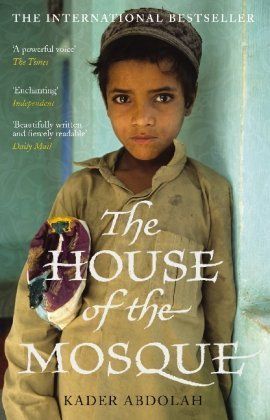
The House of the Mosque by Kader Abdolah, translated by Susan Massotty
Kader Abdolah is an Iranian author who came to the Netherlands as a political refugee and now writes in Dutch. This book of historical fiction centers around Aqa Jaan, a carpet merchant, manager of the bazaar, and head of the house of the mosque in the town of Senejan. Around him whirl the characters of our narrative: Shahbal, who wants to bring the modern world to the mosque; the grandmothers, who care for the house and attend to all the gossip; Imam Alsaberi and his wife, Zinat, and daughter Sadiq, who is waiting for a marriage proposal. This book begins in 1950 Iran and continues through political intrigue, religious upheaval, revolution, and bitter suppression to tell an ultimately hopeful story.
Content warnings for child death, misogyny, ableism, r-slur, torture, mention of sexual assault.
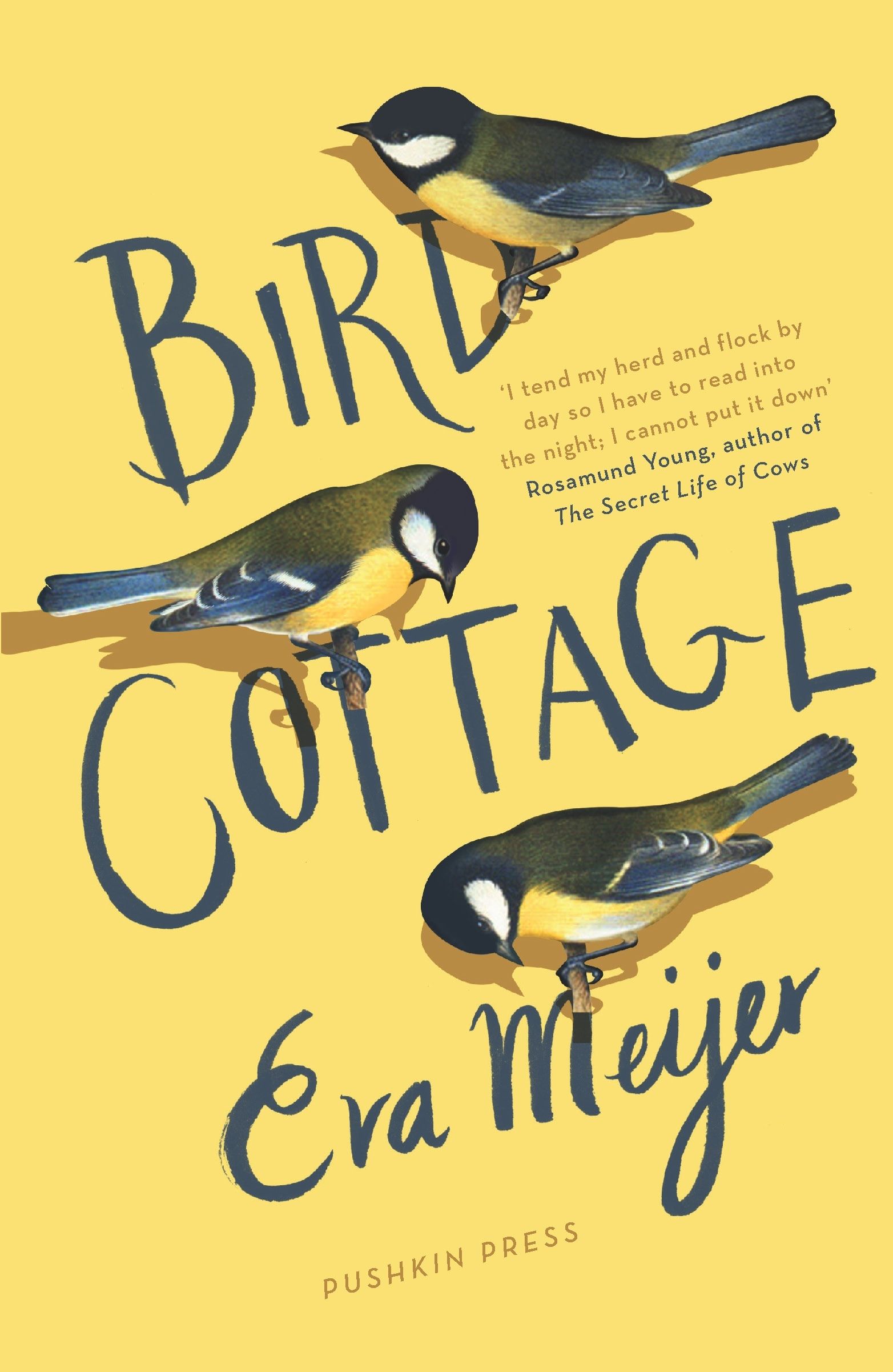
Bird Cottage by Eva Meijer, translated by Antoinette Fawcett
Len Howard was an unconventional woman. In 1938 she bought a plot of land, and the house built there would become a haven for wild birds. She fed them, studied them, and published articles about their behavior, intelligence, and their music. She was a recluse, knowing that too much activity would scare her birds away and disturb their behavior. A self-made naturalist, she published many articles and a book about her birds. This book by Eva Meijer is a novelized account of Howard’s story, a fictional attempt to get into the mind of this woman who loved birds, who studied them, and who was a natural-born naturalist.
Content warning for animal death.
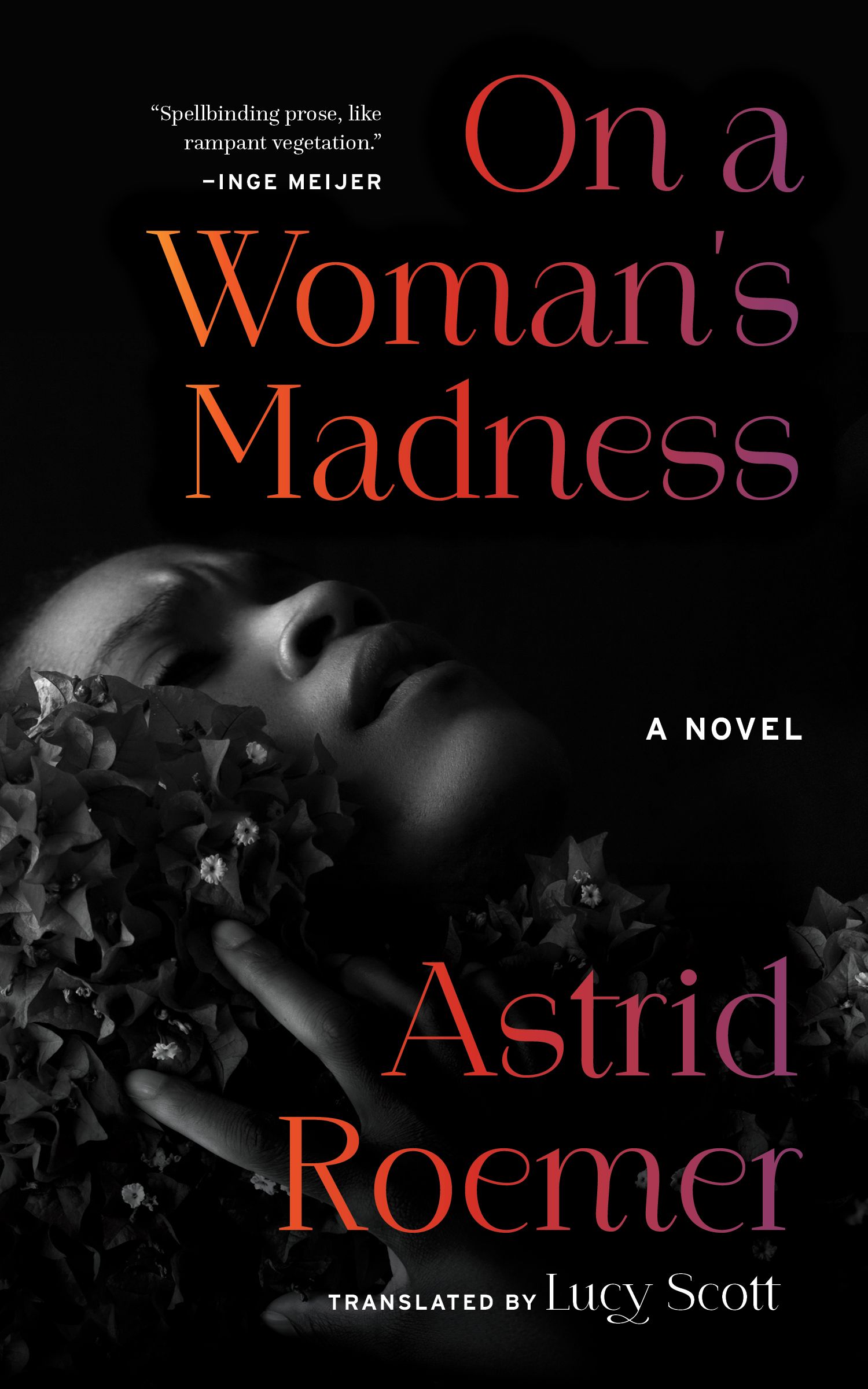
On a Woman’s Madness by Astrid Roemer, translated by Lucy Scott
In this strange, sensual novel, Roemer writes of the cruelty of the life of Noenka, a woman in Suriname struggling to live the life of independence and sexuality that she prefers under the pressures of the society around her. She has left her husband Louis after just days, and after disapproval rumbles around her, she leaves her city for another where she’ll find new loves — the chaotic, wild love of eclectic, orchid-loving Ramses, the quiet queer bond of Gabrielle. Roehmer’s book is poetic and twisting, and almost hard to keep track of, as we experience Noenka’s life through a blur of memory, flashback, feeling, and grief.
Content warnings for sexual assault and rape, depression, domestic and emotional abuse, sex shaming, violence, ableism, suicide, alcoholism, institutionalization, abortion.
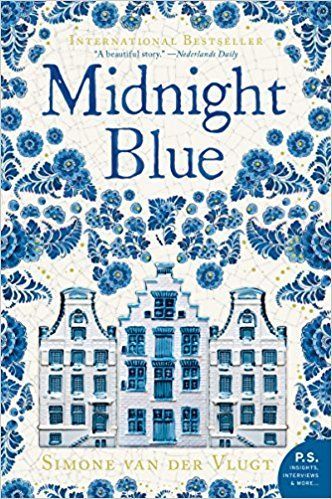
Midnight Blue by Simone van der Vlugt, translated by Jenny Watson
Young widow Catrin loves to paint. Forced to flee Amsterdam when her past comes to haunt her, she paints pottery in a small town, helping them to create an entirely new style that challenges imported porcelain. But with the growing fame of their new technique comes that old past to haunt her, with added risk that she’ll lose her new success and independence to all that she left behind. This is an intriguing historical fiction about Dutch Porcelain that touches on other events such as the Delft explosion of 1654 or the plague in 1655. Fans of the genre will really enjoy this one.
Content warnings for miscarriage, death, child death.
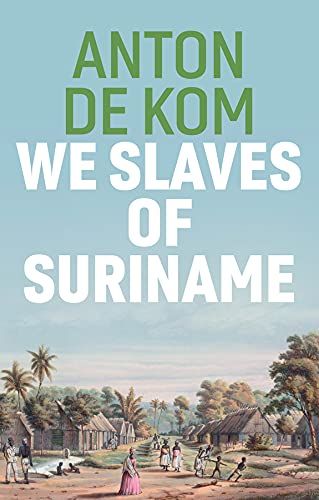
We Slaves of Suriname by Anton de Kom, translated by David McKay
Proclaimed as “the first book on Surinamese history written by a Surinamese man,” this book is the story of Suriname from the horrors of Dutch slavery to the transition into independence. It took a long time for this book to be published in English. De Kom was a political activist who was repeatedly silenced by the Dutch government — banned from giving lectures, imprisoned, and driven into exile — and the first edition was heavily censored, only resurfacing in the 1960s as De Kom’s legacy was revisited and reconsidered. It’s only been translated in the past few years (here’s my source — plus, read for more!). This book can be difficult to read but is an important and exciting new add to Dutch literature in translation.
Content warnings for racism, torture, violence, sexual assault/rape, police brutality, institutionalization.
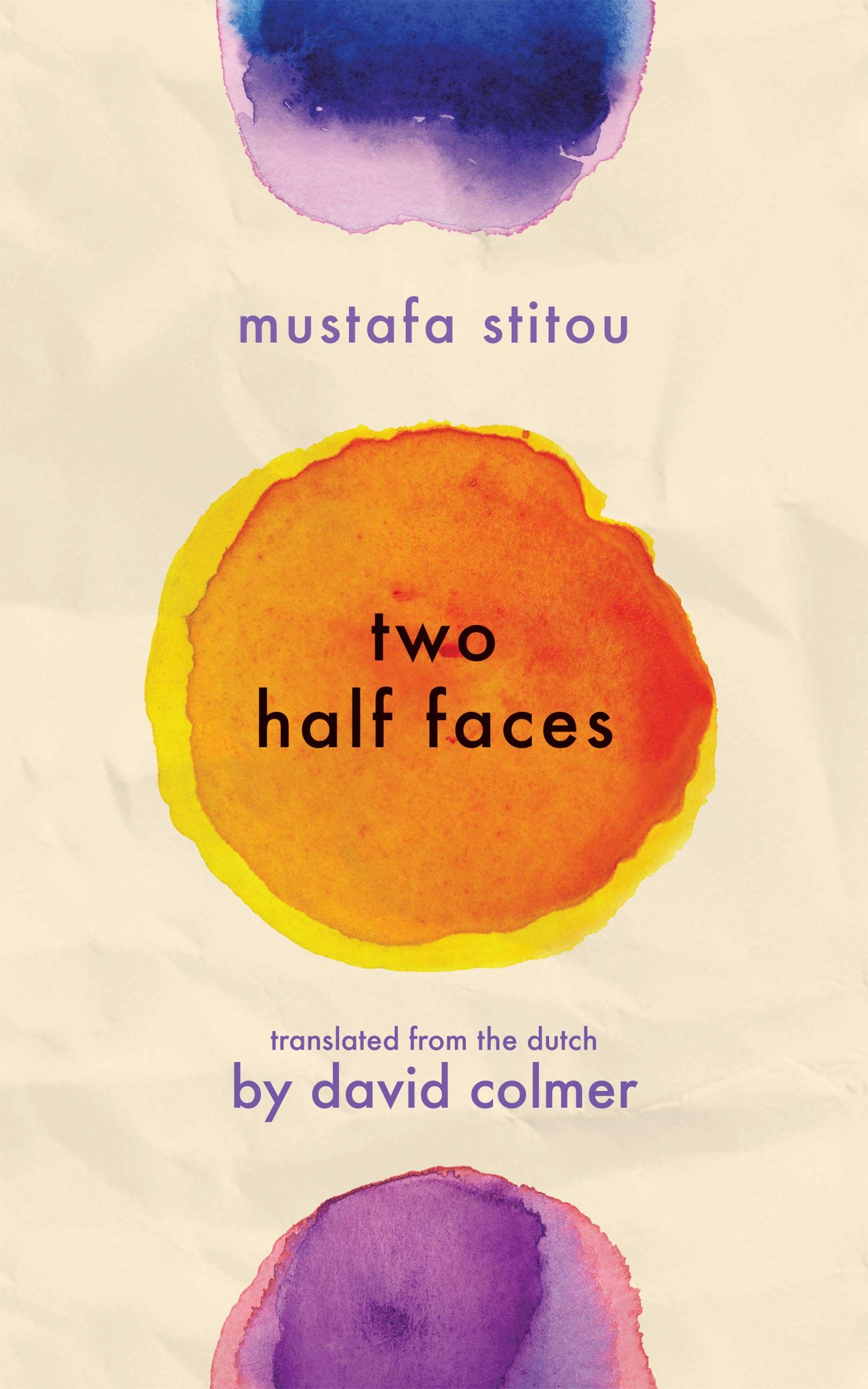
Two Half Faces by Mustafa Stitou, translated by David Colmer
Stitou is a Moroccan Dutch poet who has won the Jan Campert Prize and A. Roland Holst Award for his work. In this collection in translation from Phoneme Media, we get poems from across all of his collections, with the original Dutch on the left and the translation on the right. The poems touch on religion, God, and spirituality, evoking an irreverent tone as it questions. They touch on his grief at the deaths of his parents, of trying to remember them, to hold onto their relationships. His teasing, skeptical tone gives his poems a feeling of rebellion and have helped him become a leading poet of his time.
Content warnings for mentions of suicide, racism, ableism.
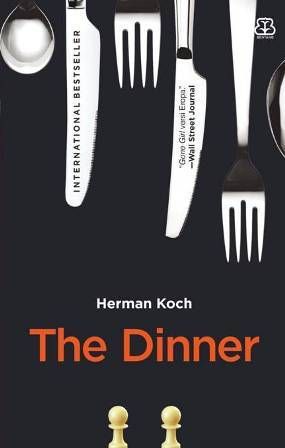
The Dinner by Herman Koch, translated by Sam Garrett
Picture a dinner table at a posh restaurant populated with four of the most privileged, possibly worst people you’ve ever met. Welcome to The Dinner, in which a man, his wife, his brother, and his sister-in-law all meet to discuss something none of them want to bring into the open — a horrible thing that their sons did, and everything that goes with it. Secrets unfold, the protagonist’s dark, angry past unpeels as the book goes on, and we realize just how unreliable our narrator is and just how awful these people and their decisions really are. It’s an internationally bestselling thriller about the dissociation only the most privileged people can have.
Content warnings for classism, violence, racism, homophobic language, and mention of sexual assault.

We Had to Remove This Post by Hanna Bervoets, translated by Emma Rault
Queer woman Kayleigh takes the job as a moderator for a social media platform because she needs the money. After a recent breakup, she addresses an imaginary reader as she explains what she did at the company and how the poor workplace conditions and the psychological toll of watching disturbing videos and conspiracy posts all day every day wore them down until the very idea of right and wrong began to break between their own fingers. At just 160 pages, this book is upsetting and thought-provoking, asking us to consider how social media has the potential to change the way we think, and how constant exposure to the worst of humanity can damage us in ways we can’t take back.
Content warnings for homophobic slur, self-harm, animal cruelty, anti-Semitism, fatphobia, suicide.
Looking for more works in translation? Check out these books from Catalonia, Japan, Southeastern Europe, Argentina, Central Africa, Japan, Ukraine, Chile, Germany, Indonesia, Peru, Italian, and East Africa, and books translated from Arabic, Modern Greek, and French. Or you can check out all of our in translation content.
If you have recommendations or requests for future lists of books in translation, or if you want me to know about a book I missed, please let me know on Twitter!
Adblock test (Why?)











